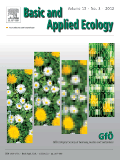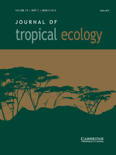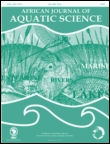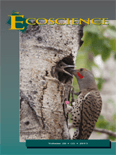
WEB ECOLOGY
Scope & Guideline
Unraveling the Complexities of Web Ecology
Introduction
Aims and Scopes
- Ecological Interactions and Biodiversity:
The journal emphasizes studies that explore interactions among species, including predator-prey dynamics, competition, and symbiosis, contributing to our understanding of biodiversity and ecosystem functioning. - Spatial Ecology and Distribution Modeling:
Research focusing on spatial patterns in ecological data, including species distribution models and landscape ecology, is a core area, helping predict ecological outcomes based on environmental variables. - Impact of Anthropogenic Factors:
Many papers investigate the effects of human activities, such as urbanization and land-use change, on ecological processes and biodiversity, providing insights into conservation and management strategies. - Climate Change and Ecosystem Responses:
The journal features studies that examine how climate change affects species, habitats, and ecosystem services, highlighting the urgent need for adaptive management in the face of global change. - Innovative Methodologies in Ecology:
WEB ECOLOGY encourages the use of novel techniques, including environmental DNA analysis and remote sensing, to enhance ecological research and data collection.
Trending and Emerging
- Environmental DNA (eDNA) Applications:
The growing use of eDNA methodologies highlights an emerging trend in biodiversity assessment and monitoring, allowing researchers to detect and quantify species presence in various environments more efficiently. - Urban Ecology and Human Impact Studies:
Research focusing on urban ecosystems and the impacts of human activities on wildlife and biodiversity is trending, reflecting a societal need to understand and mitigate urbanization effects. - Climate Change Adaptation Strategies:
There is an increasing focus on identifying and modeling ecological responses to climate change, particularly in terms of species adaptation and resilience, underscoring the urgency of addressing climate-related ecological issues. - Interdisciplinary Approaches to Ecology:
The integration of ecology with fields such as technology, economics, and social sciences is gaining traction, promoting a holistic understanding of ecological challenges and potential solutions. - Pollination and Plant-Pollinator Interactions:
Recent papers emphasize the importance of pollination dynamics and their implications for ecosystem health and agricultural productivity, highlighting the critical role of pollinators in maintaining biodiversity.
Declining or Waning
- Traditional Ecological Surveys:
There appears to be a waning emphasis on traditional field surveys and observational studies, as researchers increasingly adopt advanced technologies like environmental DNA and remote sensing to gather ecological data. - Generalized Ecological Models:
The use of generalized models that do not account for spatial heterogeneity or specific ecological contexts is declining, replaced by more sophisticated models that integrate local ecological nuances and variability. - Focus on Localized Case Studies:
There is a noticeable decrease in publications centered on localized case studies without broader implications, as the journal shifts towards research with global relevance or that informs large-scale ecological theories.
Similar Journals

BASIC AND APPLIED ECOLOGY
Exploring the intricate connections of nature and science.BASIC AND APPLIED ECOLOGY, published by Elsevier GmbH in Germany, stands out as a premier journal in the field of ecology, evolution, behavior, and systematics. With its ISSN 1439-1791 and E-ISSN 1618-0089, the journal enjoys a distinguished reputation, evidenced by its classification in the Q1 category for Ecology in 2023 and impressively ranking #89 out of 721 in this domain according to Scopus. Since its inception in 2000, it has served as a vital platform for disseminating high-quality research that bridges theoretical insights and practical applications in ecology. Researchers, professionals, and students alike can look forward to the latest findings that not only foster a deeper understanding of ecological processes but also inform sustainable practices crucial for our environment. As the journal continues its journey through to 2024, it remains committed to advancing ecological knowledge and supporting innovative research in an ever-evolving field.

JOURNAL OF TROPICAL ECOLOGY
Illuminating Biodiversity in Tropical EnvironmentsThe JOURNAL OF TROPICAL ECOLOGY, published by Cambridge University Press, serves as a pivotal platform for advancing knowledge in the field of ecology, particularly within tropical environments. With an ISSN of 0266-4674 and an E-ISSN of 1469-7831, this esteemed journal has been a key resource since its inception in 1985, maintaining a focus on empirical research that addresses the complexities of tropical ecosystems. It holds a respectable Q3 ranking in the Ecology, Evolution, Behavior and Systematics category as of 2023, indicating its significant contribution to the field, although it remains within the competitive mid-range. The journal publishes original research, reviews, and methodological articles that illuminate the rich biodiversity and unique ecological processes of tropical regions, fostering a deeper understanding of conservation challenges. Accessible from the United Kingdom, this publication appeals to a diverse audience of researchers, professionals, and students keen on exploring ecological dynamics in tropical settings, and plays a crucial role in promoting scientific discourse and collaborative efforts aimed at preserving our planet's vital ecosystems.

Neotropical Biology and Conservation
Advancing Knowledge for a Sustainable NeotropicsNeotropical Biology and Conservation, published by Pensoft Publishers, serves as a pivotal platform for researchers and professionals dedicated to the understanding and preservation of biodiversity in the Neotropical region. This Open Access journal, operational since 2006 and based in Brazil, invites contributions that delve into the complexities of ecology, evolution, and conservation strategies pertinent to the diverse ecosystems of South and Central America. With a commendable 2023 impact factor reflected in its Q3 rankings across multiple categories including Animal Science, Ecology, and Plant Science, it stands as a valuable resource for academics seeking to publish innovative findings and foster dialogue in these critical areas of study. The journal's commitment to open access ensures that knowledge is readily available to anyone interested in advancing the field of neotropical biology and conservation. Join the global conversation and contribute to the vital work of preserving our planet’s rich biological heritage through rigorous research published in this esteemed journal.

AFRICAN JOURNAL OF AQUATIC SCIENCE
Championing ecological insights for thriving aquatic environments.AFRICAN JOURNAL OF AQUATIC SCIENCE, published by TAYLOR & FRANCIS LTD, is a premier scholarly journal dedicated to the field of aquatic science, ecology, and environmental management, playing a crucial role in advancing research and knowledge in these vital areas. With an impressive Q2 ranking in both Aquatic Science and Ecology, Evolution, Behavior and Systematics, the journal seeks to publish high-quality research encompassing a wide range of topics related to freshwater and marine ecosystems, including biodiversity, conservation strategies, and the impacts of climate change. Featuring a rich history of publication from 2000 to 2024, the journal not only embraces rigorous peer review but also aims to foster collaboration and dialogue among researchers, practitioners, and students interested in aquatic environments. Readers will find that the journal’s commitment to impactful scientific communication is reflected in its notable rankings within the Scopus database, making it an essential resource for those engaged in aquatic research and management.

GLOBAL ECOLOGY AND BIOGEOGRAPHY
Elevating Understanding of Our Planet's EcosystemsGLOBAL ECOLOGY AND BIOGEOGRAPHY is an esteemed academic journal published by Wiley that focuses on the dynamic interplay between ecological and biogeographical processes across the globe. With a strong commitment to advancing our understanding of biodiversity, conservation, and global change, this journal has secured a prestigious Q1 ranking in several categories, including Ecology, Ecology, Evolution, Behavior and Systematics, and Global and Planetary Change, highlighting its significant influence in the field. Since its inception in 1998, the journal has consistently provided a platform for high-quality research, featuring original articles that address critical ecological questions and emerging biogeographical trends. Researchers aiming to publish impactful work will appreciate the journal's rigorous peer-review process and its accessibility to a global audience. With a commendable track record reflected in its Scopus rankings, this journal is an essential resource for anyone dedicated to the study of ecology and biogeography.

ACTA OECOLOGICA-INTERNATIONAL JOURNAL OF ECOLOGY
Unveiling Insights into Ecological DynamicsACTA OECOLOGICA-INTERNATIONAL JOURNAL OF ECOLOGY, published by Elsevier, stands as a prominent platform for disseminating innovative research in the diverse field of ecology. Operating since 1983 and continuing to make significant contributions into 2024, this journal features critical studies that advance our understanding of ecological systems, behaviors, and conservation efforts. With an impressive Q2 ranking in both the ecology and nature conservation categories, it exemplifies high-quality scholarship, reflected in its Scopus rankings—#74 in Environmental Science and #254 in Agricultural and Biological Sciences. Researchers, professionals, and students in the field are invited to explore the latest findings and methodologies that address pivotal ecological issues. As a journal committed to fostering academic collaboration, ACTA OECOLOGICA is essential for anyone dedicated to enhancing their comprehension of ecological dynamics and advancing sustainability practices globally.

ECOSCIENCE
Exploring the intersection of ecology and environmental science.ECOSCIENCE, published by Taylor & Francis Inc, stands as a prominent journal in the fields of Ecology and Environmental Science, recognized for its commitment to advancing knowledge since its inception in 1994. With an ISSN of 1195-6860 and an E-ISSN of 2376-7626, the journal caters to a diverse audience of researchers, professionals, and students passionate about ecological and environmental issues. In 2023, it achieved Q2 and Q3 rankings in the Scopus category of Ecology and Evolution, Behavior and Systematics, reflecting its significance within the academic community. Moreover, ECOSCIENCE occupies notable positions in Scopus rankings, including Rank #324 in Agricultural and Biological Sciences and Rank #210 in Environmental Science, symbolizing its role as a catalyst for disseminating high-quality research. Although currently not open access, the journal's multifaceted scope encourages in-depth discussions on ecological diversity, conservation strategies, and sustainable practices, making it an invaluable resource for those engaged in ecological research and practice.

Folia Oecologica
Exploring the Intersection of Ecology and Agriculture.Folia Oecologica is a distinguished open-access journal published by WALTER DE GRUYTER GMBH, focusing on critical research in the fields of agricultural and biological sciences, ecology, and forestry. Established as a vital platform for the dissemination of knowledge, this journal has been providing free access to its valuable content since 2017, catering to an international audience engaged in environmental and ecological studies. With its ISSN 1336-5266 and E-ISSN 1338-7014, Folia Oecologica has earned notable ranks in Scopus, placing it in the 62nd percentile for Agricultural and Biological Sciences and the 50th percentile for Environmental Science. The journal's commitment to high-quality research is reflected in its positions in the Q2 and Q3 quartiles across various categories in 2023. As it converges years from 2006 to 2024, Folia Oecologica continues to foster scholarly dialogue and collaboration among researchers, professionals, and students, making significant contributions to the understanding and preservation of our ecological systems.

WETLANDS
Championing the Science of Wetlands for TomorrowWETLANDS is a prestigious academic journal dedicated to advancing the understanding of wetland ecosystems, published by SPRINGER and based in the Netherlands. Established in 1981, this journal has consistently offered high-quality research on ecological dynamics, environmental chemistry, and broader environmental science topics, as indicated by its notable rankings in the 2023 category quartiles: Q2 in Ecology and Environmental Science (miscellaneous) and Q3 in Environmental Chemistry. The journal impacts the scientific community significantly, as reflected in its Scopus rankings, which place it within the top percentiles of its field. This makes WETLANDS an essential resource for researchers, professionals, and students aiming to stay at the forefront of wetland research and conservation efforts. With continual contributions from experts worldwide, it not only disseminates critical findings but also fosters collaboration and innovation within this vital area of environmental science.

ECOLOGICAL RESEARCH
Connecting researchers to shape the future of ecological science.ECOLOGICAL RESEARCH is a prestigious academic journal published by WILEY, dedicated to advancing the field of ecology and its associated disciplines. Since its inception in 1986, the journal has consistently provided a platform for high-quality, peer-reviewed research, contributing significantly to the understanding of ecological systems and their complexities. With an impressive 2023 impact factor reflected in its Q1 ranking in the category of Ecology, Evolution, Behavior, and Systematics, it stands among the top journals in its field, as evidenced by its Scopus rank of #192 out of 721 and placement in the 73rd percentile. While accessible through standard subscription models, this journal plays an essential role in disseminating crucial findings and innovative methodologies to researchers, professionals, and students alike. With a commitment to fostering ecological knowledge and collaboration, ECOLOGICAL RESEARCH continues to influence ecological practices and policies, shaping the future of research in this critical area.